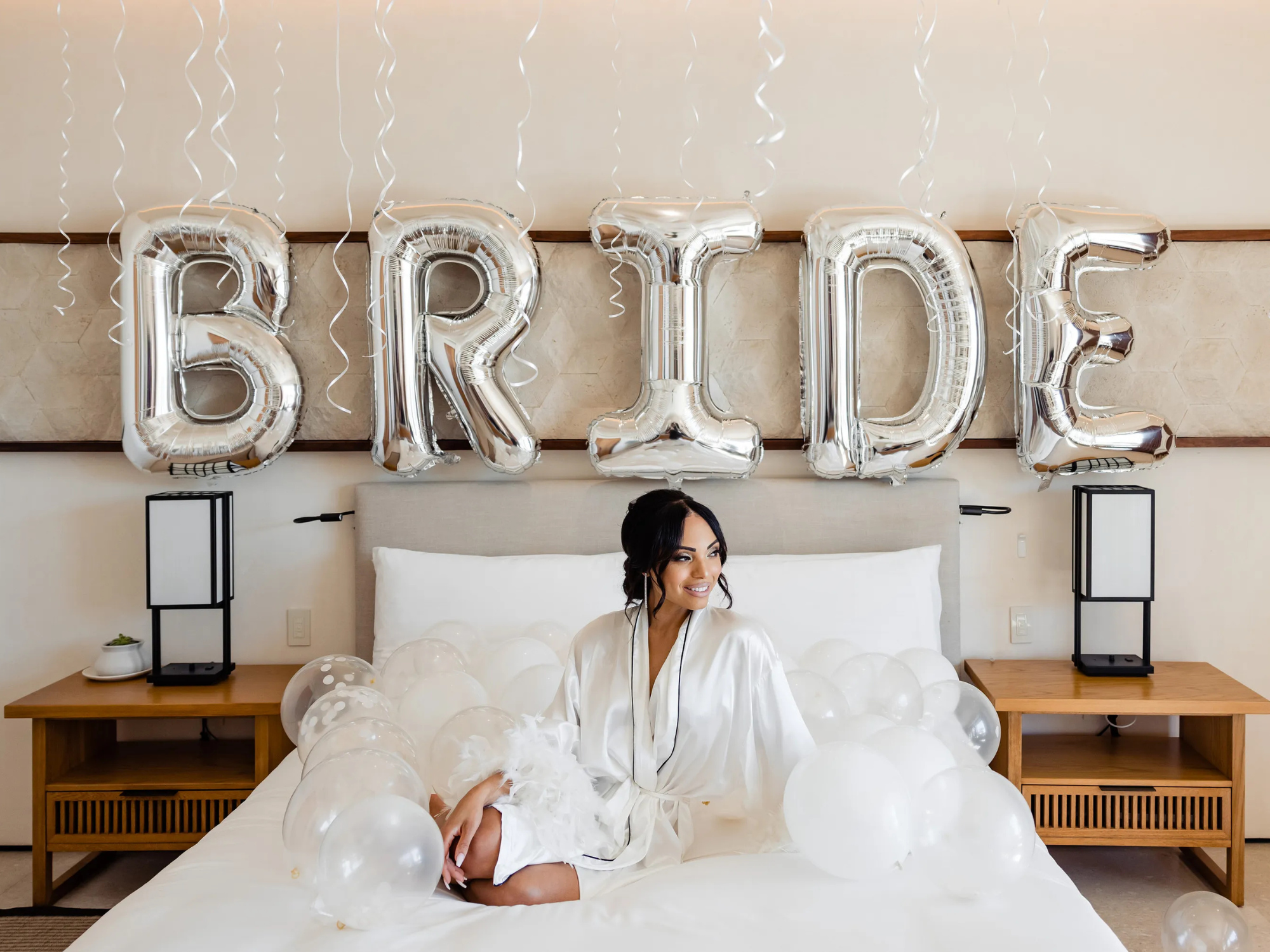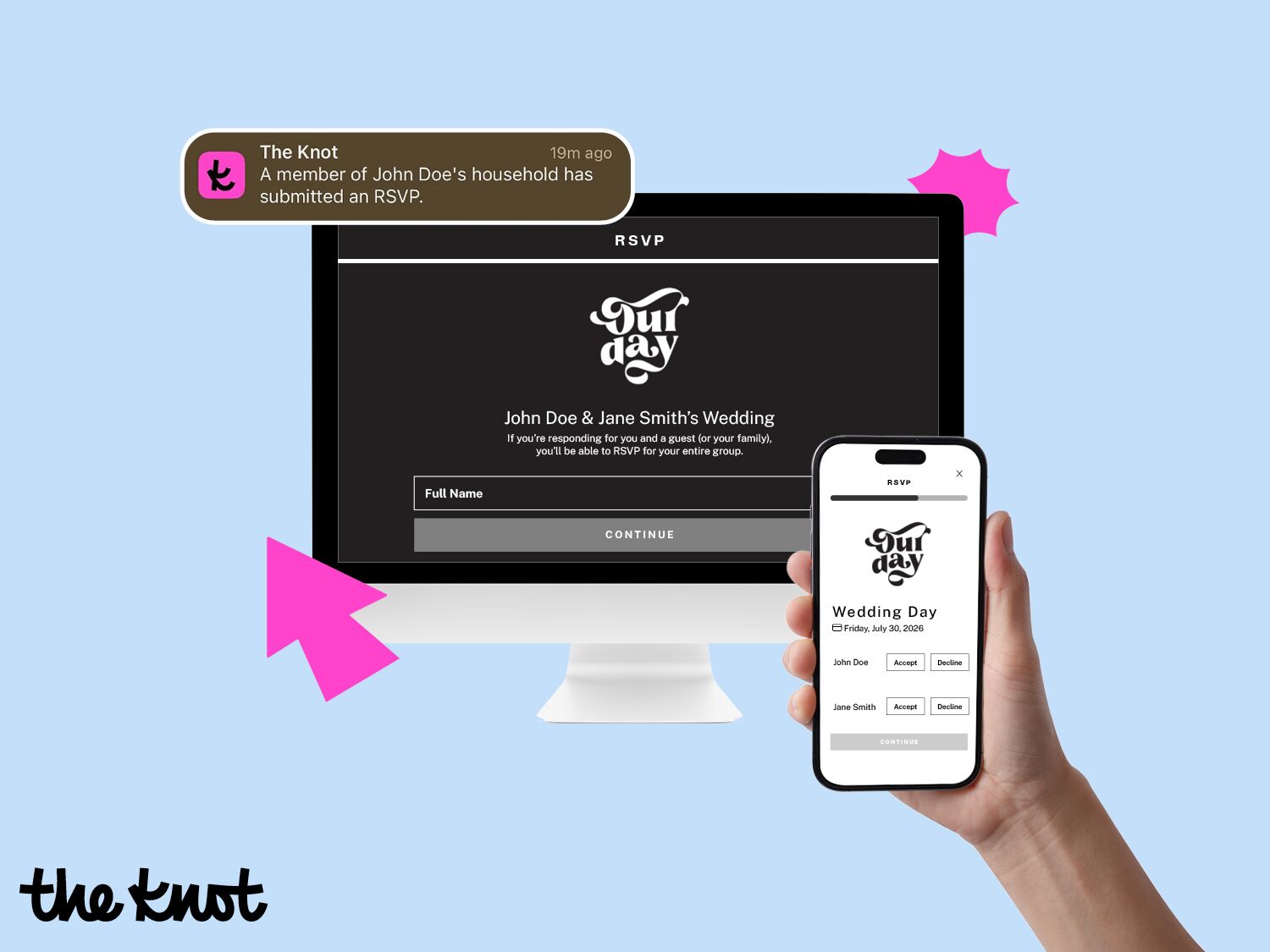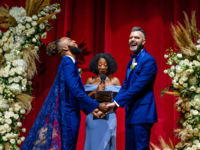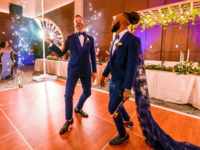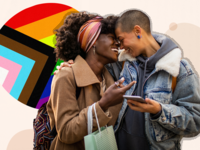How to Find LGBTQIA+-Friendly Wedding Vendors With Ease
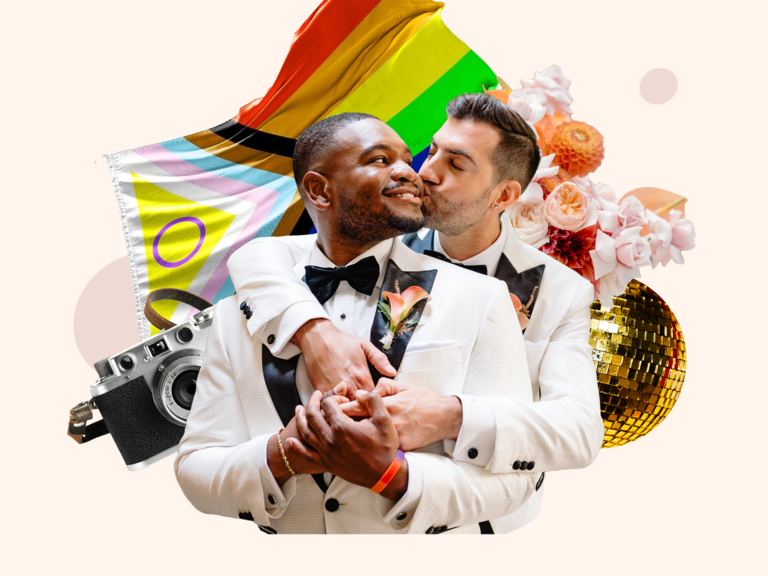
This piece has been reviewed and fact-checked by Kirsten Palladino, an inclusivity consultant and the cofounder of Equally Wed.
Here's the thing—the truth is that all vendors should be LGBTQIA+-friendly wedding vendors, inclusive and supportive of all marriers, regardless of sexual orientation or gender identity. Unfortunately, what should be the case is not always a reality. Additionally, searching for and booking wedding vendors is a big task no matter what, and feeling added pressure to ensure a pro is affirming of your identity is an undue burden for marriers. So while the onus should be on pros to showcase their allyship, there are also steps to-be-weds may wish to take to help ensure they feel safe and supported throughout their entire wedding journey.
Additionally, it isn't LGBTQIA+ marriers who are seeking affirming vendors. Brides, grooms and marriers who care about their LGBTQIA+ guests and attendants—as well as LGBTQIA+ equality in general—are prioritizing vendors and venues who demonstrate those values. So no matter why you're searching for inclusive vendors, we're here to illuminate how you can do so with ease.
To avoid potential emotional distress that could come from interactions with pros who aren't inclusive, several well-respected vendors weigh in on the advice they have for marriers navigating the wedding vendor booking process, especially when it comes to finding LGBTQIA+-friendly wedding vendors.
In this story:
Meet Our Experts
These talented wedding experts opened up about their advice for marriers and fellow pros alike.
- John Campbell of John Campbell Events and Design: John Campbell is a Florida–based expert and a The Knot Ones to Watch honoree; he plans beautiful weddings through his eponymous company.
- Josie V Skinner of Josie V Photography: Josie V Skinner is a The Knot Best of Weddings Award winner and a renowned wedding photographer based in Denver.
- Osiris Rojas and Michele Harvey of Modern Love Productions: The Knot Ones to Watch honorees Osiris Rojas and Michele Harvey are the wife-and-wife videographer team behind Modern Love Productions based in Miami.
- Riley Glenn of Riley Glenn Photography: Riley Glenn is an expert wedding photographer dually based in Austin and Los Angeles. The pro is a The Knot Best of Weddings Hall of Fame recipient.
- Tirzah Stein of Nearlywed Coaching: Tirzah Stein is a notable wedding officiant and coach in Denver and owner of Nearlywed Coaching. Tirzah was also recognized as a 2024 honoree in The Knot Ones to Watch.
Ways to Spot Allyship Among Vendors
Industry professionals shared some guidance for couples when it comes to researching and vetting potential wedding vendors. Additionally, they shared suggestions for fellow pros to keep in mind to better aid marriers in the vendor-booking process.
Vendors Should Make Their Allyship Known
"Vendors play a pivotal role in fostering an inclusive atmosphere for nearlyweds," emphasizes photographer Riley Glenn. "Implementing simple yet impactful steps can signal openness and support." Glenn encourages vendors to include pronouns on their website—both their own as well as a field for nearlyweds to enter theirs in contact forms. Josie V Skinner adds that a statement of inclusion is another smart addition to a vendor's website. The pro suggests having "a statement of inclusivity on your website in multiple places. My recommendation would be the homepage, about page and below or above the contact form."
Pay Attention to Language
Beyond pronouns and a possible statement of inclusion, inclusivity should extend to all language on a vendor's website. Osiris Rojas and Michele Harvey explain that if marriers see supportive and inclusive language, then that's often a cue that a business is "open to all couples and affirming and would love to provide their services at your wedding. If an LGBTQIA+ couple visits a website that refers only to bride and groom, they may not feel welcome. It's important to note that people want to see themselves represented when looking at the portfolio of potential wedding vendors."
Planner John Campbell agrees that language is important. When perusing a potential vendor's website, he suggests a few questions to-be-weds can ask themselves: "Have they explicitly stated that they serve diverse clientele? Do they use inclusive language? Do they show LGBTQIA+ couples in the work they share?" He goes on to emphasize that "the point of being inclusive is to create spaces where people feel seen, supported, and safe. If you have a desire to work with diverse clientele, you have to make room for them in your business."
Notice the type of inclusive language vendors use, as well. Some wedding vendors and venues are happy to work with two women or two men, but are less enthusiastic about nonbinary marriers. If you see phrases such as "brides and grooms" or bride/groom on contracts, that could indicate their limited knowledge or lack of inclusive values for the entire LGBTQIA+ community.
What Experience Do They Have?
In addition to the language that vendors use, understanding the experience pros bring to the table is critical. Glenn emphasizes that "it's pivotal to ensure they embrace inclusivity wholeheartedly. Consider delving into their track record with diverse couples. Are they adept at seamlessly using a range of pronouns, not only for the marriers but also for their guests and wedding party? Can they adeptly navigate various family dynamics? And importantly, can they capture LGBTQIA+ couples authentically, steering clear of heteronormative stereotypes?"
Beware of Performative Actions
A big caveat regarding the experience that marriers are looking for is that it shouldn't be performative. Campbell shares that he sometimes comes across "vendors who are so passionate about working with LGBTQIA+ folks that the passion can move into the realm of fetishization. At times, this can be almost as frustrating and belittling as someone being blatantly discriminatory. Be wary of people who want to put you in boxes you don't identify with, even if it's coming from a place of excitement. The LGBTQIA+ community isn't monolithic, and we deserve to be appreciated and celebrated in our diverse and complex ways of being."
Many of the pros I spoke with warned against tokenism and rainbow washing. Osiris and Harvey note that "a common red flag for rainbow washing is if a vendor is only sharing their support for the LGBTQIA+ community during Pride Month but does not share LGBTQIA+ couples in their portfolio or social media." Glenn concurs and encourages engaged folks to "watch for insincerity in inclusivity efforts, such as superficial gestures without substantive action. Consider the diversity of their staff and their affiliations with organizations known for exclusionary practices. By staying vigilant for these red flags, nearlyweds can select vendors who genuinely prioritize inclusivity."
Read Reviews
This is a universal truth: Wedding vendor reviews are a gold mine when it comes to selecting a dream team of pros. So why would it be any different for finding LGBTQIA+-friendly vendors? "We always recommend reading reviews when hiring vendors," Rojas and Harvey emphasize.
Campbell says that "some LGBTQIA+ couples will specifically mention whether or not a vendor was inclusive when they write a review. For vendors who haven't worked with a lot of LGBTQIA+ couples and don't have the portfolio to show off diverse love on their social channels, this is a great way to get a sense of someone's past experience with them."
Be Transparent and Don't Settle
"Don't settle," urges officiant Tirzah Stein. Once again, this is a mantra that all nearlyweds should keep in mind, but especially those looking for LGBTQIA+-friendly vendors. "There are so many inclusive queer-owned and allied vendors out there that want nothing more than to meet you, support you, and be a part of your day," adds Stein. "It is important and okay to take your time in really making sure the vendors you hire are the exact right fit for you. It is okay to be direct and clear about what you are looking for and when you have those initial discovery calls, speak up about what matters to you most. If you have any feelings that the vendor is not the right fit for you, do not feel obligated to hire them. Listen to your gut and don't ignore any feelings that make you feel turned off or icky."
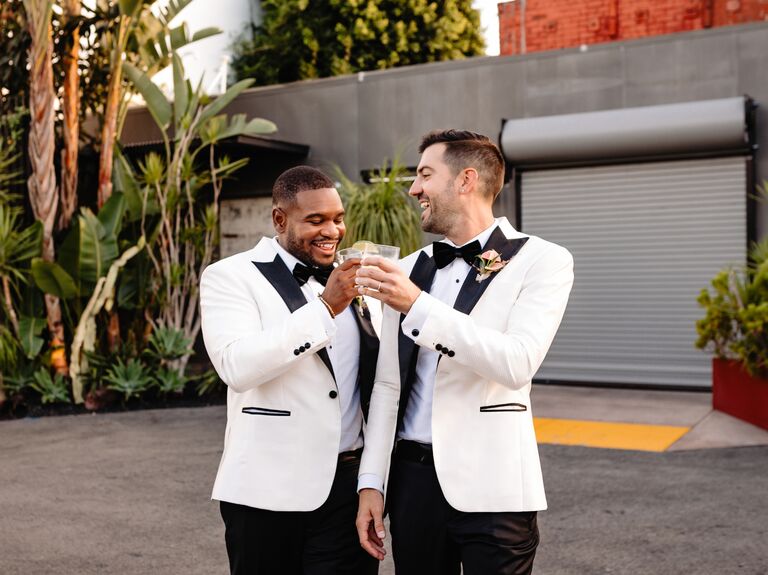
Where to Find LGBTQIA+ Wedding Vendors
Now that you have an understanding of things to look out for when gauging inclusivity with vendors, it's time to get to working finding potential pros. Keep these next steps in mind as you dive in.
Rely on Inclusive Resources
A smart first step is to only look for pros in spaces where inclusivity is a priority. "A great way to find inclusive and affirming vendors is to look for vendors in publications that are LGBTQIA+ affirming, such as The Knot Vendor Marketplace and many others," explain Rojas and Harvey.
Notably, all vendors who are listed on The Knot Vendor Marketplace must adhere to our nondiscrimination policy. As outlined in our statement of inclusivity, by partnering with The Knot, "our partners are agreeing to serve all people to the best of their ability. We are proud to facilitate a community representing a diverse range of backgrounds, experiences, beliefs, and customs. We believe celebrations can serve as a force for good, by bringing people together and building connections across cultures and geographies. In order to do this, we must advocate for inclusivity, ultimately strengthening the future of celebrations. We believe that all couples should be served equally and do not condone discrimination based on factors such as race, ethnicity, gender identity, sexual orientation or other protected characteristics."
The pros I spoke with offered a bevy of resources that to-be-weds can keep in mind. Here are some top sites and books to consult while planning.
Inclusive wedding resources to consider:
- The Knot
- Equally Wed
- Black Gay Weddings
- Dancing With Her
- Love Inc.
- Rainbow Wedding Network
- LGBTQ I Do (for Colorado weddings)
- Offbeat Wed
- A Practical Wedding
Consider LGBTQIA+-Owned Businesses
"Consider that vendors who are part of the LGBTQIA+ community may bring valuable personal insight and understanding to their services, enriching your overall experience," says Glenn.
Stein reminds marriers that a simple internet search is a good starting point. "Don't forget you can Google exactly what you are looking for: 'queer Black and female DJ in Seattle' for example. Use the identity filters on The Knot and use inclusive specific platforms like Equally Wed to find vetted and inclusive vendors," encourages Stein. As Stein mentioned, The Knot Vendor Marketplace has diversity filters that allow users to search for businesses based on categories such as LGBTQIA+-owned, Asian-owned, Black-owned, Latinx and Hispanic-owned, Native American-owned, women-owned and veteran-owned.
"While vendors don't need to be part of the LGBTQIA+ community to offer affirming support, it's crucial that they're genuinely passionate about fostering inclusivity," adds Glenn. "Prioritizing vendors who are genuinely invested in LGBTQIA+ issues can significantly enhance your comfort on your wedding day."
Seek Out References
Word of mouth and relying on trusted pros to offer references is another solid way to find affirming pros. Skinner encourages marriers to start with a vendor you feel confident about. "Someone whose profile and work indicates that they are inclusive and welcoming. Once you have one vendor they will be able to point you towards other inclusive vendors, and most likely steer you away from discriminatory ones."
Starting with a great planner is the route Campbell encourages nearlyweds to take. "Look into hiring an LGBTQIA+ planner to help you find an amazing vendor team. It isn't necessarily a guarantee that LGBTQIA+ planners exclusively work with inclusive and affirming vendors, but they are definitely a great resource and will be more inclined to work with supportive event partners.
Remember Your Worth
"You are loved and deserve to feel celebrated and supported always," emphasizes Stein. "I promise you for every one experience of discrimination or one vendor who does not support you, there are hundreds of vendors who would love nothing more in this world that to be in your corner to celebrate your love and rejoice in your special day!! We are out there and we cannot wait to meet you!"
"Stay true to yourself while planning," encourages Skinner. "Queer love is gorgeous to behold and expressing your love is a bold and sacred act!"

